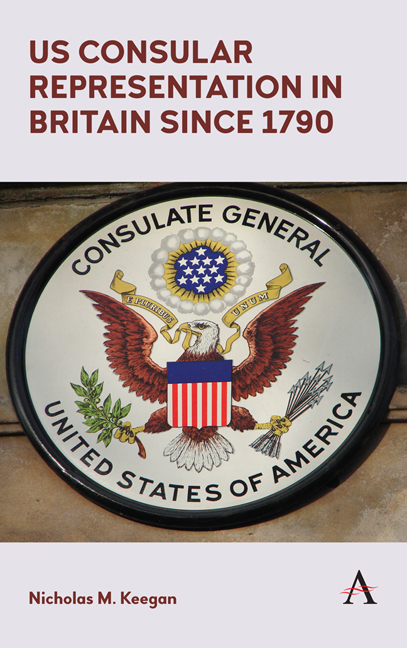Book contents
- Frontmatter
- Dedication
- Contents
- List of Illustrations
- Foreword
- Preface
- Acknowledgements
- Introduction
- PART 1
- PART 2
- PART 3
- Chapter Six Consular Posts and Consular Agencies in Major Cities
- Chapter Seven Belfast
- Chapter Eight Birmingham
- Chapter Nine Bradford
- Chapter Ten Bristol
- Chapter Eleven Cardiff
- Chapter Twelve Dublin
- Chapter Thirteen Dundee
- Chapter Fourteen Dunfermline
- Chapter Fifteen Edinburgh and Leith
- Chapter Sixteen Falmouth
- Chapter Seventeen Liverpool
- Chapter Eighteen London
- Chapter Nineteen Newcastle upon Tyne
- Chapter Twenty Southampton
- Chapter Twenty-One Stoke on Trent
- Chapter Twenty-Two An Evolving, Adaptive Service
- Appendix: Locations and Categories of Consular Offices
- Notes
- Sources
- Bibliography
- Index
Chapter Twenty-One - Stoke on Trent
from PART 3
Published online by Cambridge University Press: 21 June 2018
- Frontmatter
- Dedication
- Contents
- List of Illustrations
- Foreword
- Preface
- Acknowledgements
- Introduction
- PART 1
- PART 2
- PART 3
- Chapter Six Consular Posts and Consular Agencies in Major Cities
- Chapter Seven Belfast
- Chapter Eight Birmingham
- Chapter Nine Bradford
- Chapter Ten Bristol
- Chapter Eleven Cardiff
- Chapter Twelve Dublin
- Chapter Thirteen Dundee
- Chapter Fourteen Dunfermline
- Chapter Fifteen Edinburgh and Leith
- Chapter Sixteen Falmouth
- Chapter Seventeen Liverpool
- Chapter Eighteen London
- Chapter Nineteen Newcastle upon Tyne
- Chapter Twenty Southampton
- Chapter Twenty-One Stoke on Trent
- Chapter Twenty-Two An Evolving, Adaptive Service
- Appendix: Locations and Categories of Consular Offices
- Notes
- Sources
- Bibliography
- Index
Summary
Stoke on Trent, in Staffordshire, known locally as Stoke, was formed in 1910 from an amalgamation of six towns – Tunstall, Burslem, Hanley, Stoke, Fenton and Longton – and became a city in 1925. The main industry in all these towns was the production of earthenware and stoneware, and among the dozens of companies were world-famous ones such as Royal Doulton, Spode and Wedgwood. Such was the concentration of these industries that the area was known as ‘The Potteries’.
Over the years the location of the US consulate changed in line with the municipal changes, but it was always unique since there were no other consulates in any of the towns. The first consular office was an agency established in Tunstall in 1863 headed by Thomas Llewellyn; by 1869 it had been upgraded to a consulate headed by J. S. Runnels and moved to Burslem in 1877 (although it still retained the name of Tunstall), and then finally to Stoke on Trent in 1910. Runnels was succeeded in 1871 by Josiah M. Lucas. Lucas, a lifelong Illinois friend of Abraham Lincoln, had had a fairly chequered career before being appointed to Tunstall. He had been a clerk in the General Land Office, Postmaster of the House of Representatives, an army captain dealing with commissary matters and been nominated (unsuccessfully) for the post of consul at Singapore. In 1873, John Copestake, a local Burslem man, joined the consulate as a junior clerk and began a career that lasted more than fifty-one years. Lucas was followed in 1879 by Edward Ephraim Lane, of Connecticut, who served until 1886. He was evidently held in high regard locally and when he was recalled to the United States he was presented with a silver tea and coffee service by William Woodall, the Member of Parliament for Hanley, on behalf of a number of leading Staffordshire citizens. He died two years after returning to America. Jacob Schoenhof arrived in 1886. He had been born in Germany but had moved to the United States in his early twenties and become a naturalized American citizen. He had been in the wholesale lace business for many years until retiring in 1884. An expert in textile tariffs, wages and economics he was appointed to Burslem by President Grover Cleveland ‘under the belief that his observations there would be of value to the Government’.
- Type
- Chapter
- Information
- US Consular Representation in Britain since 1790 , pp. 227 - 234Publisher: Anthem PressPrint publication year: 2018



